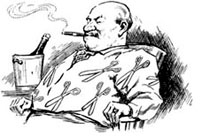
‘Praise Worship’: Sharing a Pillow With God
GUEST COLUMN
There are some Catholic parishes trying to imitate the contemporary “praise worship” that has seized many evangelical Protestant churches.
In these Protestant “praise” churches, I, an Evangelical, long to hear an old and great Protestant hymn, which does sometimes surface — but rather like a ghost returning to haunt the new occupant. Indeed, the old traditional hymns sound eerie in upbeat praise churches, which seldom sing anything lacking pep and percussion.
There is an old reason fueling the appetite for this burgeoning type of worship service. It is the suspicion of form and structure as dulling, if not suffocating, authentic worship. In praise worship, so the theory goes, worship is freer because, well, the worshiper is freer. In these churches, in which any vestige of liturgy was cast out ages ago, a new “structure” for Sunday worship emerges. Praise teams now stand between pastors and pews, and work the crowd — urging worshipers into worshiping. Hymnals are seldom used, because one is directed to words thrown on a wall, not words printed in a book. Soon no one will need to look down for anything anymore, as Scripture readings too are now being thrown on a wall.
Hymns, like history, are not of much interest to these contemporary Christians who are heavily into therapy and only dabble in theology. Of course the old hymns are not replaced by choruses invented extemporaneously for each service, but generally by copyrighted choruses dating from around the 1970s. Though some are nice, most are sung with mantric repetition (didn’t classical Protestants denigrate the Rosary for being vain repetition?), but in the praise context the fear of repetition is forgotten because the words of the choruses are essentially our words, not the words of some distant past figure about whom we know little. As one who once thought the old Reformed tradition too narrow for singing hymns only from the Psalms, I now understand something of their reasoning. The flight to praise worship is not solely propelled by fear of form. It is also fueled by the notion that worship is truly worship when worshipers look enthusiastic. This used to be an argument against liturgy, where motions and words and creeds could not be taken as conferring inward assent, so form and formula were suspect. But praise worship has its own “liturgical” expectations. The strong, silent type — never mind the shy type — is an anomaly to the psychology of praise. Indeed, silence is scarcely to be found in churches where this kind of service takes over. Praise worship is made to provoke Christian enthusiasm and militance. This is an admirable and necessary component of Christian living, but to gauge that a frothy frenzy approaching a pep rally is indication that Christians are being made ready for battle is questionable. “Onward Christian Soldiers”? Not really.
You May Also Enjoy
Reviews of God Without Being... The Case for Christian Humanism... Disposable People?... With Liberty and Justice for Whom?... Uncommon Decency... Valuing Life... Images of Sainthood... Wisdom's Daughter... Dignity and Decadence...
Is Deal Hudson's career ruined because of sexual debauchery? Apparently not.
Spiritual Freeloaders... Ensoulment & Material Fusion... A Dinner Date With Death... Catholic Schoolteachers for Obama... A Chicken in Every Pot?... Word & Deed... Penalties for Legislative Crimes... Priests, Not Politicians... Divorce & Culpability... Calumnies Against the Charasmatic Movement... Juvenile Exhibitionism... A Third Economic System?... Covenant or Contract?... and more

